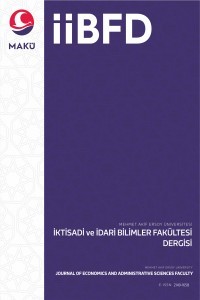BULGARİSTAN’DA TÜRK AZINLIĞA UYGULANAN ŞİDDET (1944-1989): GALTUNG’UN BARIŞ MODELİ BAĞLAMINDA BİR İNCELEME
Profesör Johan Galtung’un şiddet ve barış anlayışı Uluslararası İlişkiler disiplininde barış ve çatışma gibi temel problemlerin daha kolay anlaşılıp özellikle de çatışma çözümleri bağlamında kalıcı çözümlerin oluşturulmasında önemli rol oynamaktadır. Bu makale, Bulgaristan Komünist Partisi’nin (BKP) iktidarı döneminde (1944-1989) Bulgaristan’da yaşayan Türk azınlığının durumunu Galtung’un geliştirdiği şiddet ve barış kavramlarının perspektifinden analiz etmektedir. Resmi arşiv belgeleri ve bu belgeliklerden üretilmiş ikincil kaynaklar ışığında ilgili dönemdeki (1944-1989) Türk azınlığının sosyoekonomik ve kültürel durumu analiz edilerek şiddet durumları tespit edilmeye çalışılmıştır. Bu dönemde Türklerin maruz kaldıkları şiddet/çatışma durumlarının iyi anlaşılması Soğuk Savaş sonrası tesis edilen göreceli pozitif barış hâlinin hak ettiği değeri görmesi açısından son derece önemli olmaktadır.
Anahtar Kelimeler:
Bulgaristan, Türk Azınlık, Johan Galtung, Şiddet, Pozitif Barış
THE VIOLENCE APPLIED TO THE TURKISH MINORITY IN BULGARIA (1944-1989): AN INVESTIGATION IN THE CONTEXT OF THE GALTUNG'S PEACE MODEL
Professor Johan Galtung's understanding of violence and peace plays an important role for understanding the basic problems such as peace and conflict in the International Relations discipline, and in particular, it is important for establishment of permanent solutions in the context of conflict resolution. This article analyses the situation of the Turkish minority living in Bulgaria during the rule of the Bulgarian Communist Party (BCP) (1944-1989), in particular from the perspective of violence and peace concepts developed by Galtung. In order to identify the violence situations, it was analysed the socio-economic and cultural situation of the Turkish minority in the relevant period (1944-1989), in the light of official archival documents and secondary sources reproduced by this archives. A good understanding of the violence/conflict situations, which are experienced by the Turks during this period, is extremely important in terms of seeing the value of relative positive peace, established in the post-Cold War period.
Keywords:
Bulgaria, Turkish Minority, Johan Galtung, Violence, Positive Peace,
___
- DREZOV, K. (2001), Bulgaria and Macedonia: Voluntary Dependence on External Actors, J. ZIELONKA ve A. PRAVDA içinde Democratic Consolidation in Eastern Europe: International and Transitional Factors, (p. 413-436), New York: Oxford University Press.
- GALTUNG, J. (1969), Violence, Peace and Peace Research, Journal of Peace Research, (6)3, 167-191.
- GALTUNG, J. (1990), Cultural Violence, Journal of Peace Research, (27)3, 291-305.
- KOLEVA, D. (2012), Belene: Remembering the Labour Camp and the History of Memory, Social History, (37)1, 1-18.
- WEBEL, C. (ed.) ve GALTUNG, J. (ed.) (2007). Handbook of Peace and Conflict Studies. New York: Routledge.
- ISSN: 2149-1658
- Yayın Aralığı: Yılda 4 Sayı
- Başlangıç: 2014
- Yayıncı: Burdur Mehmet Akif Ersoy Üniversitesi
Sayıdaki Diğer Makaleler
HASTALARIN SAĞLIK HİZMETİ KALİTESİ BEKLENTİLERİ VE ALGILAMALARI ÜZERİNE BİR ARAŞTIRMA
Gizem Zevde AYDIN, Elif DİKMETAŞ YARDAN
AMERİKA BİRLEŞİK DEVLETLERİ’NİN İKLİM DEĞİŞİKLİĞİ POLİTİKASI: SORUMLULUK VE İNKÂR İKİLEMİ
E-SAĞLIK UYGULAMALARININ FARKINDALIĞINA YÖNELİK BİR ARAŞTIRMA
Erdal EKE, Merve UYSAL, Dilruba UĞURLUOĞLU
DOĞRUDAN YABANCI YATIRIM, BÜYÜME VE ÇEVRESEL KALĠTE ĠLĠġKĠSĠ: TÜRKĠYE “DĠBE YARIġAN” BĠR ÜLKE MĠ?
FİNANSAL ARAÇLARIN TMS/TFRS VE BOBİ FRS ÇERÇEVESİNDE MUHASEBELEŞTİRME ESASLARININ KARŞILAŞTIRILMASI
PRÜFER-KARAGÜL ALGORİTMASI: GEZGİN SATICI PROBLEMİ İÇİN YENİ BİR YAKLAŞIM
